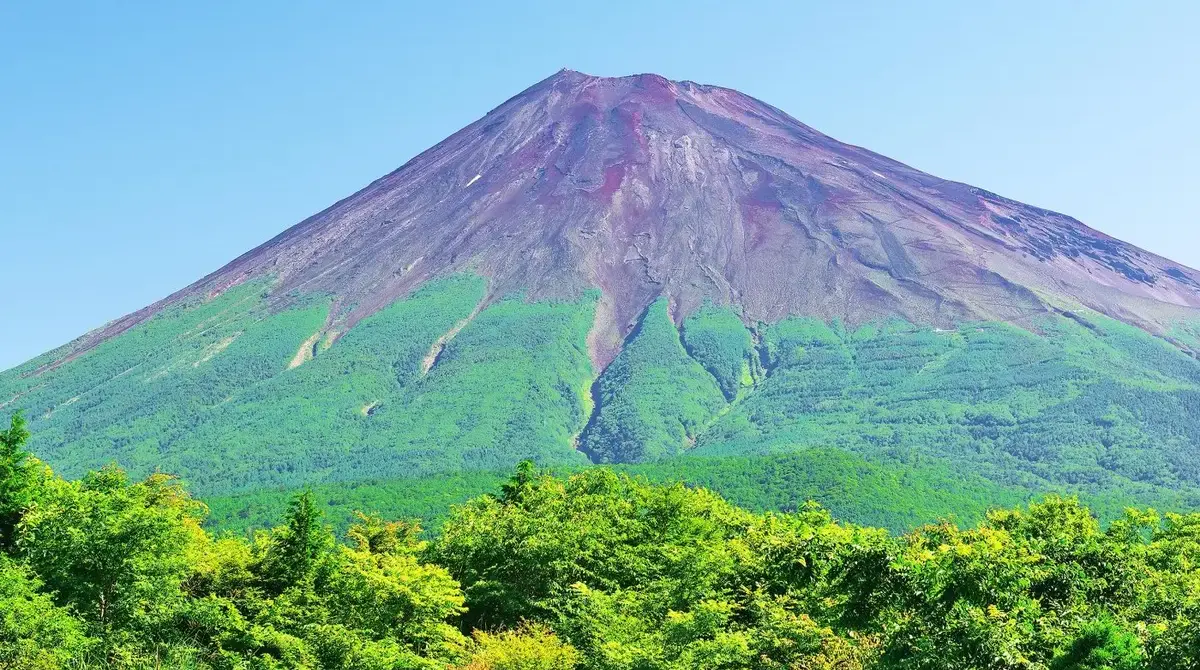This year the iconic Japanese Mount Fuji remained surprisingly snow-free; For the first time in 130 years of observations, its slopes were bare. Mount Fuji is known for its majestic slopes that are often covered in snow for most of the year. Every autumn, the volcano’s snow cover usually appears in the first week of October. Last year, snow at the summit was seen for the first time on October 5, but this year the situation was different.
Snow disappeared from Mount Fuji
The summit of Mount Fuji looks like it’s missing its annual white makeover. The warm weather prevented snow from falling on Japan’s highest mountain, according to local Kofu Meteorological Bureau forecaster Yutaka Katsuta. This is the last time the mountain has been bare since comparative data were first recorded in 1894. This broke previous records set in 1955 and 2016 when the first snow fell on October 26.
Why is this happening?
According to Katsuta, high temperatures were experienced this summer, and these high temperatures continued until September, preserving the cold air brought by the snow. Katsuta noted that climate change may affect the timing of snow cover formation. In fact, the summer of 2024 was the hottest summer on record in Japan, matching the extreme temperatures seen in 2023.
Mount Fuji: The center of hiking tourism
Mount Fuji is not only a natural sight but also a hub for hiking enthusiasts; More than 220,000 visitors climb the steep rocky slopes every year during the tourist season. Hikers often climb at night, motivated by the reward of seeing dawn from the 3,776-meter (12,388-foot) summit.
However, there were fewer climbers this year. Fighting against excessive tourism, Japanese authorities imposed daily limits on the entrance fee and the number of tourists. Besides being a physical challenge and a natural snow attraction, Mount Fuji is also a source of aesthetic inspiration. It has inspired countless works of art, including Hokusai’s legendary Great Wave. The last eruption occurred about 300 years ago.
Bare slopes of Mount Fuji
The unusual lack of snow on Mount Fuji creates a major ecological concern. The lack of early snowfall is not only an anomaly for Japan’s most revered peak, but also a concrete indicator of broader climate changes affecting our planet.
Such changes in seasonal patterns can have long-term effects on local ecosystems and affect flora and fauna adapted to lower temperatures. In addition, melting snow traditionally contributes to the renewal of freshwater resources in the surrounding area. Delay in snow accumulation may lead to water shortages in subsequent seasons.
Cultural significance of the mountain
Mount Fuji and its snows have deep cultural significance that is deeply woven into the fabric of Japanese identity. It serves as a symbol of natural beauty and spiritual connection that permeates literature, folklore, and art.
A snowy mountain landscape is more than a picturesque painting; it resonates with historical narratives and personal journeys. As Japan confronts these climate changes, it offers an opportunity to reflect and adapt.
Scientists and policymakers must collaborate on strategies to mitigate these changes so that this iconic mountain continues to inspire future generations while preserving its ecological health and cultural heritage.
Snow delay on Mt.Fuji
Scientists are investigating why snowfall is delayed on Mount Fuji. They examine local and global climate conditions, temperature changes, and historical climate data to understand how climate change affects Mt.
Advanced meteorological technology helps them predict future snow patterns. The research could help the local community adapt to changes at Mount Fuji, as well as deepen our understanding of mountain climates around the world.
Consequences of lack of snow
The lack of snow on Mount Fuji underlines the need to raise awareness about climate. Environmental groups and governments use it to inform people about the effects of climate change.
The aim is to raise awareness about sustainable development and carbon footprint reduction. These efforts promote shared responsibility to preserve the natural beauty of places like Mount Fuji for future generations. The disappearance of snow from Mount Fuji is not just a weather anomaly; This appears to be a symptom of the larger problem of climate change. It reminds us that our actions affect not only our immediate environment, but the entire world.
Source: Port Altele
